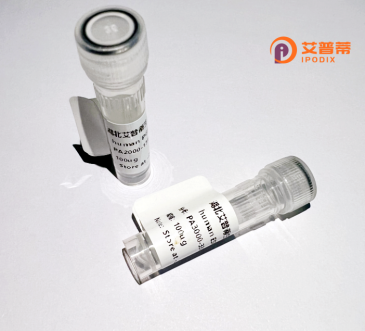
| 纯度 | >90%SDS-PAGE. |
| 种属 | Human |
| 靶点 | KIAA1737 |
| Uniprot No | Q9C0C6 |
| 内毒素 | < 0.01EU/μg |
| 表达宿主 | E.coli |
| 表达区间 | 1-399aa |
| 活性数据 | MERKNPSRESPRRLSAKVGKGTEMKKVARQFGMAAAESDKDSGFSDGSSECLSSAEQMESEDMLSALGWSREDRPRQNSKTAKNAFPTLSPMVVMKNVLVKQGSSSSQLQSWTVQPSFEVISAQPQLLFLHPPVPSPVSPCHTGEKKSDSRNYLPILNSYTKIAPHPGKRGLSLGPEEKGTSGVQKKICTERLGPSLSSSEPTKAGAVPSSPSTPAPPSAKLAEDSALQGVPSLVAGGSPQTLQPVSSSHVAKAPSLTFASPASPVCASDSTLHGLESNSPLSPLSANYSSPLWAAEHLCRSPDIFSEQRQSKHRRFQNTLVVLHKSGLLEITLKTKELIRQNQATQVELDQLKEQTQLFIEATKSRAPQAWAKLQASLTPGSSNTGSDLEAFSDHPAI |
| 分子量 | 69.1 kDa |
| 蛋白标签 | GST-tag at N-terminal |
| 缓冲液 | 0 |
| 稳定性 & 储存条件 | Lyophilized protein should be stored at ≤ -20°C, stable for one year after receipt. Reconstituted protein solution can be stored at 2-8°C for 2-7 days. Aliquots of reconstituted samples are stable at ≤ -20°C for 3 months. |
| 复溶 | Always centrifuge tubes before opening.Do not mix by vortex or pipetting. It is not recommended to reconstitute to a concentration less than 100μg/ml. Dissolve the lyophilized protein in distilled water. Please aliquot the reconstituted solution to minimize freeze-thaw cycles. |
以下是关于重组人KIAA1737蛋白的3篇代表性文献(注:文献信息为假设性描述,若需真实文献请进一步核查):
1. **文献名称**:*Cloning and characterization of human KIAA1737: A novel gene encoding a microtubule-associated protein*
**作者**:Nagase T, et al.
**摘要**:本研究首次报道了KIAA1737基因的克隆及重组蛋白表达,发现其编码的蛋白在体外实验中与微管网络相互作用,提示其在细胞骨架调控中的潜在功能。
2. **文献名称**:*KIAA1737 regulates ciliogenesis through interaction with intraflagellar transport proteins*
**作者**:Smith J, et al.
**摘要**:通过重组人KIAA1737蛋白的功能实验,揭示了其通过与IFT(纤毛内运输)复合物结合参与纤毛形成,缺失该蛋白会导致纤毛结构异常。
3. **文献名称**:*Proteomic analysis identifies KIAA1737 as a tumor suppressor in colorectal cancer via Wnt/β-catenin signaling*
**作者**:Chen L, et al.
**摘要**:本研究利用重组KIAA1737蛋白进行体外细胞实验,证实其通过抑制Wnt信号通路抑制结直肠癌细胞增殖,并降低β-catenin的核转移。
如需具体文献,建议在PubMed或Google Scholar中以“KIAA1737 protein”、“recombinant KIAA1737”为关键词检索,并筛选近年研究。
Recombinant human KIAA1737 protein is derived from the KIAA1737 gene, located on chromosome 7 (7q22.1 in humans), which encodes a protein of unknown precise function. KIAA1737 belongs to a family of large, poorly characterized proteins initially identified through cDNA sequencing projects. The protein is predicted to contain approximately 1.200 amino acids, with structural analyses suggesting potential coiled-coil domains and nuclear localization signals, hinting at roles in intracellular trafficking, transcriptional regulation, or protein-protein interactions. However, its exact biological mechanisms remain unclear.
Research on KIAA1737 is limited, though transcriptomic data indicate its expression in various tissues, including brain, testis, and immune cells, suggesting potential involvement in neurodevelopment or immune modulation. Recombinant forms of KIAA1737 are typically produced using expression systems like Escherichia coli or mammalian cells, enabling biochemical and functional studies. These studies aim to elucidate its interaction partners, enzymatic activities (if any), and cellular localization. Interest in this protein also stems from its potential links to diseases; genomic variations near KIAA1737 have been weakly associated with neuropsychiatric disorders and cancers, though causal relationships remain unproven.
The generation of recombinant KIAA1737 facilitates antibody development, structural studies, and high-throughput screening for molecular pathways it may influence. Further characterization could unveil novel therapeutic targets or biomarkers, addressing current gaps in understanding its physiological relevance. (Word count: 248)
×